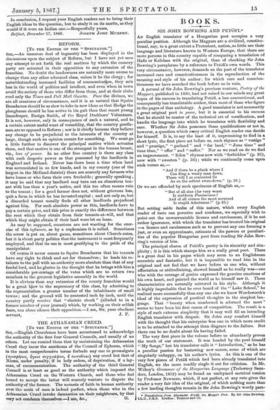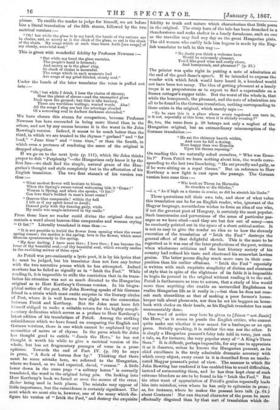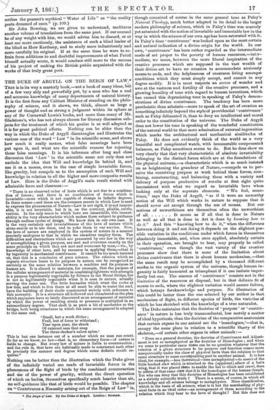BOOKS.
SIR JOHN BOWRING AND PETUFI.* AN English translator of a Hungarian poet occupies a very peculiar position. Although the Magyars are a civilized, constitu- tional, nay, to a great extent a Protestant, nation, so little are their language and literature known in Western Europe, that there are more persons in this country capable of comparing a translation of Hafiz or Kalidasa with the original, than of checking Sir John Bowring's paraphrase by a reference to Petofi's own words. This very circumstance, however, demands on the part of the translator increased care and conscientiousness in the reproduction of the meaning and style of his author ; for which care and conscien- tiousness we have searched the book before us in vain.
A perusal of Sir John Bowring's previous venture, Poetry of the Magyars, published in 1830, had not raised in our minds any great holm; of his success in translating Petofi, a less conventional, and consequently less translatable author, than most of those who figure in the pages of that anthology. A good translator is not necessarily a great original poet in posse, but it is essential to his success
that he should be master of the technical art of versification, and handle the language into which he translates with flexibility and ease. Whether Sir John possesses these qualifications or not is, however, a question which every critical English reader can decide for himself. It is, to say the least of it, unpromising to find in a short lyric, the first piece set before us, such rhymes as " vestige " and "prestige," " garland " and "far land," "June time" and tune time," " offer " and "suffer." Nor as we read on do we find an improvement. " Eden " rhymes now with "forbidden" (p. 26), now with " sweeten " (p. 36) ; while we continually come upon such verses as,—
" And if there be a plank where I
Can fling a weary man down, There will I as contented lie As on the softest swan-down." (p. 28.)
Or we are offended by such specimens of English as,—
" But of all sins the very worst Is stubborn Pessimismus !
And of all crimes the most accursed Is stupid Atheismus !" (p.35.)
But setting aside faults of this nature, which every English reader of taste can perceive and condemn, we especially wish to point out the unwarrantable licence and carelessness, if it be not rather ignorance, with which the translator has treated his original —a licence and carelessness such as to prevent any one forming a just, or even an approximate, estimate of the powers or peculiari- ties of the popular Hungarian poet from reading Sir John Bow- ring's version of him.
The principal charm of PetOfi's poetry is its sincerity and sim- plicity ; it is this which stamps him as a really great poet. There is a great deal in his pages which may seem to an Englishman eccentric and fantastic, but it is impossible to read him in the original and not feel that we have before us one who, without affectation or attitudinizing, showed himself as he really was—one who with the courage of genius expressed the genuine emotions of his own heart, and painted the world as he himself saw it. These characteristics are naturally mirrored in his style. Although it is highly improbable that he ever heard of the "Lake School," he realized more successfully than any one else we know Wordsworth'a ideal of the expression of poetical thoughts in the simplest lan- guage. That "beauty when unadorned is adorned the most" seems to have been his first canon of composition. The result is a
style of such extreme simplicity that it may well fill an intending English translator with despair. Sir John may comfort himself
with the thought that his enterprise (vas one in which more credit is to be attached to the attempt than disgrace to the failure. But there can be no doubt about his having failed.
The very first piece in the volume before us abundantly proves the truth of our statement. It was headed by the poet himself "My Songs," but his translator calls it "Introduction," as he has a peculiar passion for bestowing new names, some of which are singularly unhappy, on his author's lyrics. As this is one of the
very few pieces of Pet6fi which had been already translated into English, we the more readily single it out for criticism. In Mr, Wekey's Grammar of the Hungarian Language (Trelawney Sam". ders, London, 1852) may be found an unrhymed metrical version
by Professor Newman, which, if not perfect, at any rate gives the reader a very fair idea of the original, of which nothing more than a few leading thoughts remain in Sir John Bowring's wordy pam-
• Translations from Als:oander Petlifi, the Magyar Poet. By sir John Bowing, LLD., F.R.S. London : Tmbner and Co.
phrase. To enable the reader to judge for himself, we set before him a literal translation of the fifth stanza, followed by the two metrical versions :—
"Oh! but while the glass is in my hand, the hands of the nations are in chains, and, as merry as is the clink of the glass, so sad is the clank of the chain. My songs which at such time burst forth [are songs] of my cloudy, sorrowful soul."
This is given with wonderful fidelity by Professor Newman :— "But while my hand the glass sustains,
The people's hand is fettered; And merry as is the glass' ring, So clank of chains is mournful.
The songs which in such moments bud Are songs of my grief-blinded, cloudy soul."
Under the hands of the later translator the verse is puffed out into :—
" Oh ! but while I drink, I hear the chains of slavery,
Hear the plaint of slaves—and the nnemptied glass Dash upon the ground; but this is idle bravery, These are worthless wailings, wasted words. Alas! All the songs I sing are but the utterings clouded Of a sorrowing soul in darkest darkness shrouded."
We have chosen this stanza for comparison, because Professor Newman has hero succeeded in being more literal than in the others, and not by any means because it is the worst in Sir John Bowring's version. Indeed, it seems to be much better than the third, in which we are treated to the rhymes " garland " and "far
land," "June time" and "tune time," or than the fourth, in
which even a pretence of rendering the sense of the original is dropped altogether.
If we go on to the next lyric (p. 111), which Sir John thinks proper to dub "Perplexity "—the Hungarians only know it by the first line—we shall find the simple, natural grace of the Hun- garian's thought and style completely lost in the affectation of his English translator. The two first stanza's of his version run thus :—
" What modest flower will hesitate to bloom,
When the Spring's sweet-voiced welcoming bids it ' Come ! '
Woman is Spring, and when she speaks, '0 list!'
Can love that's bedded in man's heart resist?
"Heaven-blue campanula! within thy bell I felt as if my spirit loved to dwell ; Danced gaily with thy dancing gaily, while My smile was magic-mirrored in thy smile."
From these lines no reader could divine the original does not contain a word about heaven-blue campanulas and woman crying "0 list!" Literally translated it runs thus :—
"It is not possible to forbid the flower from opening when the sweet spring comes ; the maiden is the spring, love is the flower, which must blossom spontaneously in the spring.
"My dear darling, I have seen thee; I love thee ; I am become the lover of thy beautiful soul,—of thy beautiful soul, which sweetly smiles in the ravishing mirror of thine eyes."
As Petofi was pm-eminently a lyric poet, it is by his lyrics that ha must be judged, but his translator does not fare any better
with the two narrative poems which he has attempted. Indeed nowhere has he failed so signally as in " Istak the Fool." While reading it, it is impossible to stifle the conviction that in its trans- lation his attention was not so much directed to the Hungarian original as to Herr Kertbeny's German version. In his biogra- phical notice of the poet, Sir John Bowring speaks of his German friend in a strain which must excite surprise in the literary circles of Pest, where it is well known how slight was the connection between Petiifi and Kertbeuy. But Sir John must have felt himself obliged to make a suitable return for the highly compli-
tientary dedication which serves as a preface to Herr Kertbeny's latest edition of his translatiens of Petofi. Among the striking coincidences which we have found on comparing the English and German versions, there is one which cannot be explained by any necessities of metre or of rhyme. In the poem which Sir John has thought good to entitle "Janos the Hero," he has not thought it worth his while to give a metrical version of the whole, but has set fragmentary passages of verse in a prose epitome. Towards the end of Part IV. (p. 59) he says in prose, "A flock of herons flew by." Thinking that there must be some mistake here, we referred to the Hungarian, where we found, as we had expected, daruk, "cranes." A little
lower down in the same page "a solitary heron" is correctly translated, the word in the original being gem. On looking into Herr Kertbeny's book we found at once the source of the error, Reiher being used in both places. The mistake may appear of little importance, but the coincidence is certainly significant. The next which we must cite is, however, one of the many which dis- figure his version of " 1st& the Fool," and destroy the exquisite fidelity to truth and nature which characterizes that little poem in the original. The crazy hero of the tale has been drenched in a thunderstorm and seeks shelter in a lonely farmhouse, such an one as the traveller may find any day on the great Hungarian plain. The old woman who surlily bids him begone is made by the Eng- lish translator to talk in this way :—
" No doubt you think a welcome here Would be extremely pleasant,
You'd like good wine and costly cheer,
And honeycomb, and pheasant I" (p. 25.)
The printer was quite right in putting a note of admiration at the end of the good dame's speech. If he intended to express the wonder with which Istok would have heard it, a hundred would not have been too many. The idea of getting pheasant at a lonely tanya is as preposterous as to expect to find a capercailzie on a Sussex cottager's supper table. But the worst of the whole is, that while the honeycomb, the pheasant, and the note of admiration are all to be found in the German translation, nothing corresponding to them exists in the original, which merely says :-
"To be sure this is a place where every vagabond can turn in, is it not, especially at this hour, when it is already evening ?"
So, too, the verse from p. 28 betrays not only a neglect of the
Hungarian original, but an extraordinary misconception of the German translation :—
"He sat the chimney hearth within, And soon he fell a-dozing. More happy than was Ermelin Upon his throne reposing."
On reading this we naturally asked ourselves, "Who was Erme- lin ?" From PettiE we learn nothing about him, the words corre- sponding to the last two lines being, "He sat proudly and gaily, as if he were sitting on a royal throne." But on reference to Herr Kertbeny a new light is cast upon the passage. The German version here runs thus :—
" Wie hoch zu Thron un Hermelin So streckte er die Glieder," e, "As if high on it throne in ermine, so did he stretch his limbs."
These quotations tell their own tale, and show of what value
this translation can be for an English reader, who, ignorant of the Magyar language, nevertheless wishes to form an idea of one who, if not the greatest poet of Hungary, is certainly the most popular.
Such inaccuracies and perversions of the sense of particular pas- sages as we have cited—and they are but few out of many—can be succinctly pointed out in the space of a short critical notice. It is not so easy to give the reader an idea as to how the slovenly execution of the translation of " Ist6k the Fool" destroys the general effect of that delightful sketch. This is the more to be regretted as it was one of the later productions of the poet, written when wholesome criticism and the best literary society of his country had refined his taste and chastened his somewhat lawless genius. The latter poems display much more care in their com- position than his earlier effusions. " Istok the Fool" especially is written with such exquisite simplicity of diction and clearness of style that in spite of the slightness of its fable it is impossible to begin its perusal in the original without reading it to the end.
Petofi is furthermore so true to nature, that a study of him would more than anything else enable an untravelled Englishman to realize Hungarian life as it really is ;—but then he does not com- mit such absurdities as that of making a poor farmer's house- keeper talk about pheasants, nor does he set his beggars on horse- back with shakos on their heads, as his English translator has most unaccountably done.
One word of notice may here be given to [Jlince "not Janos] the Hero," as it seems to puzzle the English critics, who cannot quite make out whether it was meant for a burlesque or an epic poem. Strictly speaking, it is neither the one nor the other. It is simply a Hungarian peasant's fairy tale told in verso, just such a tale, as, for instance, the very popular story of " A King's Three Sons." It is difficult, perhaps impossible, for any one to appreciate it as it deserves, unless he knows the Hungarian peasant, as its chief excellence is the truly admirable dramatic accuracy with • which every object, every event in it is described from an unedu- cated Magyar peasant's point of view. The manner in which Sir John Bowring has rendered it has enabled him to avoid difficulties, instead of surmounting them, and he has thus -kept clear of such extreme blunders as are to be found in his " 1st& the Fool." But his utter want of appreciation of Petofi's genius repeatedly leads him into mistakes, even where he has only to epitomize in prose ; as, for instance, where he makes the peasant hero talk (p. 61.) about Centaurs ! Nor can the real character of the poem be more effectually disguised than by that sort of translation which de- scribes the peasant's mythical "Water of Life" as "the reality poets dreamed of once." (p. 109.) Sir John Bowring, we are given to understand, meditates another volume of translations from the same poet. If our counsel be of any weight with him, we would advise him to discard, or at least use more cautiously, the assistance of such a blind leader of the blind as Herr Kertbeny, and to study more industriously and more carefully his original. If at the same time he were to re- frain from additions to and doubtful improvements of what Feta himself actually wrote, it would conduce still more to the success of his project of making the British public acquainted with the works of that truly great poet.






































 Previous page
Previous page